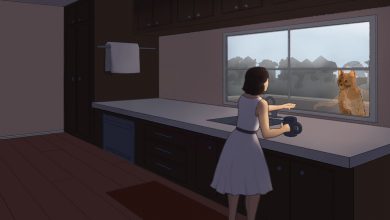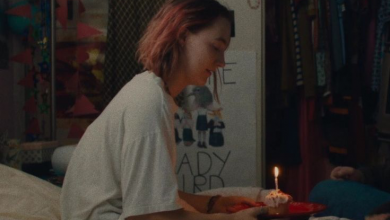“Girl, Put Your Records On”: Corinne Bailey Rae at The Novo 4/2
Image description: Corinne Bailey Rae closes her eyes while singing into a microphone, with Myke Wilson on the drums behind her.
The Novo in downtown Los Angeles is not an easy venue to play. At least, that’s my experience having only sat in the balcony section: it can be impersonal, disconnected from the crowd, and perhaps better suited to a theater-like program, rather than a concert. However, Corinne Bailey Rae completely changed the atmosphere of this venue, turning what could have been an unremarkable show into an unforgettable night.
The setup on the stage caught my attention from the beginning — a Persian rug, a table with bells and caxixi shakers, and wind chimes hung on the mic stand. The whimsical stage began to bring me and the audience into the ethereal nature that Rae would evoke later in the night, while simultaneously feeling like you could have been in someone’s living room singing with a group of friends.
Image description: Rae raises her arm while belting onstage. Illuminated by green lighting and a single spotlight, she stands on a Persian rug between her backup vocalist and guitarist.
Walking onto the stage, Rae was immediately captivating in her glittering jumpsuit. She started the concert, introducing an almost celestial ambience with “Been to the Moon.” Singing with such feeling to the crowd: “I’ve been where you are, God help me / I’ve been to the moon and stars with you,” the audience was pulled into Rae’s world and the journey she was about to take them on for the night.
Moving into “Breathless,” a number that showcased Rae’s belt, she sang, “I get so breathless when you call my name,” confiding in the audience as she questioned the chemistry between her and the one she sang the song to, the crowd. Throughout this song, and most of the show, she sang with a smile on her face, closing her eyes during emotional cruxes and opening them to see the effect she had on the audience. While it probably only took these first two songs, the audience was completely charmed by “Till It Happens to You,” which gave an opportunity for the band to shine. Kyle Bolden, the guitarist, gave an impressive electric solo before Myke Wilson took it away on the drums. The energy built until the audience was on the edge of their seats, if not already standing, and Rae brought it home, taking us back to the slow beginnings of the song.
Regrettably, I did not know most of Corinne Bailey Rae’s music before going into this concert. But this next song I did know, which she prefaced with “Everywhere we go, people know Bob Marley.” Recognizing that there was a reason for Marley’s impact on the world, not only as a reggae pioneer, but also as a social activist, Rae commented briefly on his political ideology; She discussed identifying with his message of “hope and peace and justice.” She then gave a jazz-influenced rendition of “Is This Love?” which the audience didn’t sing along with, instead appreciating Rae’s voice as she made the Marley classic her own.
Image description: Rae uses an assortment of instruments in the introduction of her next song.
After the upbeat ode that is “Paris Nights/New York Mornings,” Rae segued with a speech about how an artist — I believe referring to Theaster Gates — saved a building amidst the destruction of the South Side of Chicago in order to create a Black art archive. She artfully weaved a moment of history about the South Side into the introduction of her next song, raising attention to the importance of arts in community. She also brought notice to the significance of archiving, especially Black history archives, with the discussion of Ebony Magazine and the model, Audrey Smaltz, the inspiration for the following song. Rae commented on the power and rebellion Smaltz possessed, which was reflected in the tone of the song. “New York Transit Queen” shifted the dynamic of the concert, all of a sudden turning into a punk show, Rae shredding an electric guitar. With this extreme tone shift, Rae defied the normative practices of musical artists remaining in a single genre. This idea might be most popular in the current narrative around Beyoncé, who recently made the jump into country music with “Cowboy Carter,” facing extreme controversy, especially in predominantly white country spaces who questioned her ability to make country music. This has been a common conversation surrounding Black artists, whose music has long been categorized as R&B (rhythm and blues) or soul, stemming from the category of race records created specifically for music made by African Americans in the 1920s through 1940s. These categories have deep implications for music made by Black artists today, limiting their distribution and recognition for their music when they are limited to such categories. By bringing the audience into the punk scene, Corinne Bailey Rae reminds us not only that genres are defiable and culturally-constructed, but also of the origins of punk music in Black punk bands.
Image description: Rae lunges onstage towards the drummer while playing an electric guitar. Another guitarist watches as he plays behind her.
Rae recentered the audience to the Black art archive in Chicago with a speech discussing the advertising of Valmor, a makeup brand from the 1920s that primarily targeted African American women. She focused on the products that were obviously meant to invoke elements of white, European beauty standards, including skin lightening products and tools to straighten hair. “He Will Follow You With His Eyes” begins with a reference to these ads, saying “Ladies, don’t you long for love? / Be irresistible! / With the brighter, attractive beauty / everybody admires.” The first half of the song details all the ways that Black women could change themselves to be more appealing to these white expectations of beauty. However, halfway through the song, Rae sings, “I don’t want to leave myself behind,” shifting the view to accepting her natural beauty in its entirety as she almost chants, “My black hair kinking / My black skin gleaming / My plum red lipstick,” over and over again. She was met with choruses of “yes, girl” and “queen” from the audience as she exuded confidence and strength through these lyrics, especially from the voices of Black women in the audience whose perspectives were recognized on stage.
Image description: Rae raises her hand to the crowd, accompanied onstage by a backup vocalist and keyboardist. A woman in the audience stands and sings along.
One of her final songs, “Earthlings,” brought us back to the extraterrestrial vibe Rae created during the beginning of her performance. With synthesized noises and a warped voice, she painted an alien-like picture of looking outward into our world. The song began with the lyrics “Don’t you know earthlings, you can start again,” and continued with, “Can’t we take the lessons that we’ve learned / and make a new Utopia? / It’s up to us.” Despite the unnatural tone of the song, perhaps purposefully unsettling, Rae left one of the last messages to the audience as a powerful, relevant call-to-action amidst a tumultuous political climate.
Following “Earthlings” and a beautiful vocal solo from Alita Moses, the supporting singer throughout the show, Rae played her most known hit, “Put Your Records On.” Audience members were visible even from the balcony, having gotten up out of their seats and flocked to the front of the stage to dance to the timeless classic. It was the perfect way to end the night, especially as the lyrics draw reference from Bob Marley, emphasize the beauty of Black hair, and brought the themes in Rae’s performance to an ending as she reminded the audience, “I hope you get your dreams… You’re gonna find yourself somewhere, somehow.”
Corinne Bailey Rae’s performance at the Novo was an impressive display of emotion, genre-bending, and political awareness. Her stage presence, an effortless blend of effervescence and tranquility, created a lasting impression, touching every audience member. As I left the confines of the theater, onto the streets of downtown Los Angeles past midnight, my mind stayed with the beauty and power of Rae’s performance. Hearing the lyrics echo in my head, Rae’s music simply made me feel better: “Maybe sometimes / We got it wrong, but it’s alright.” So, my advice to you is go listen to “Put Your Records On” — as I did while writing most of this article — and get a little taste of Corinne Bailey Rae’s magic.




